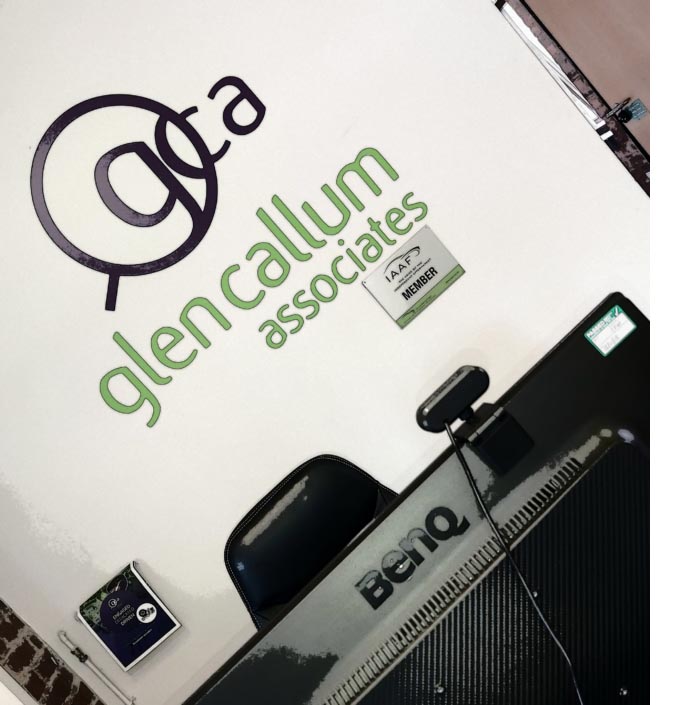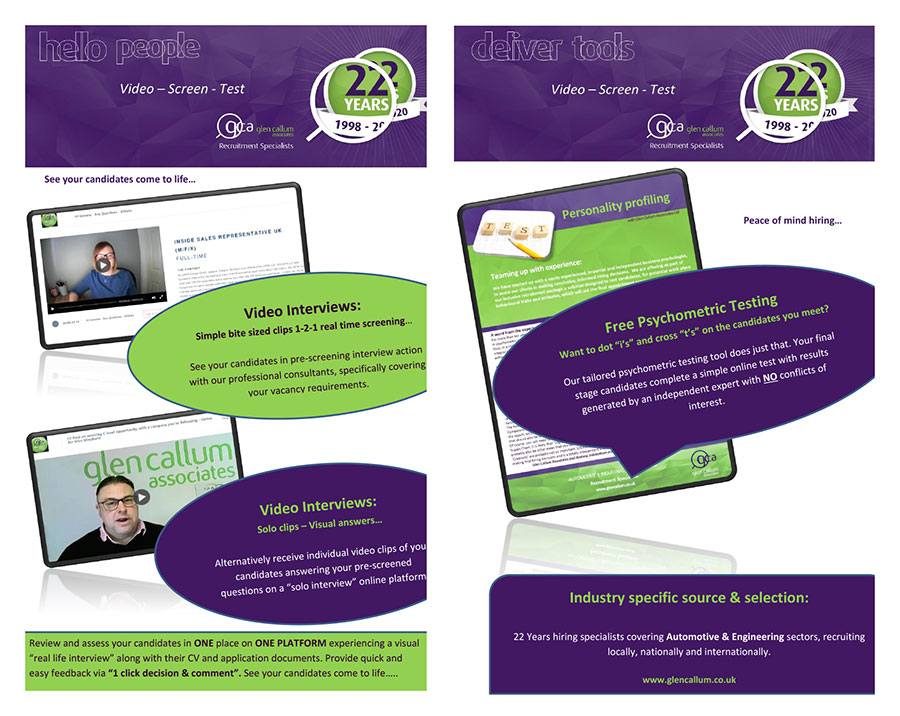MMMA features GCA as their member in the spotlight!
See details below of the feature on GCA published on the Metalforming and Machinery Makers Association website……..
This month, it’s the turn of Glen Callum Associates to be under our member’s spotlight.
With a trusted 22 year history of recruitment for the automotive aftermarket, engineering and allied industries, the established recruitment company recruit for local, national and international roles.
The MMMA sat down with Director Glen Shepherd to discuss the effects of the pandemic, current trends in recruitment, the skills gap and much more……
How has the Pandemic changed the way companies hire?
In one word – drastically. With the power of new technology companies have embraced video to conduct initial meetings. This has been revolutionary in many ways, but certainly by improving productivity and saving time. The face to face stage of the interview process is now all about inviting applicants on site after the virtual stage has took place. Although we believe that this technology was imminent, the pandemic has really accelerated companies’ reliance on this process and technology.
How has this changed your future strategy and service delivery?
It’s been revolutionary. Following the initial lockdown in March 2020, many organisations have re-strategised, re-aligned and reinvented their ways of working.
Home working has become the norm in many disciplines and “productivity” has been a familiar buzz word. Through our experience of using technology to video interview, we further invested in our own bespoke platform, allowing us the ability to record “bite sized” video interview sessions. This enables our clients to really see the candidate CV come to life. Seeing a candidate in action alongside their CV is a powerful tool.
Decision making has also been key, particularly as face to face meetings have been discouraged and many companies have not allowed 3rd party visitors onsite. Therefore, we have also invested in a psychometric profiling platform, tailored for us by an experienced independent partner whom we have worked with for over 10 years. A simple multi choice questionnaire has provided our clients with a totally independent and non-conflicting overview on the working characteristics of potential candidates.
 Whilst this tool doesn’t provide a result that advises you to hire or not, it does allow a full insight into a candidate’s traits at work, cementing gut feel on elements such as “integrity” “creativity”, “compliance” and “resilience” etc. Through this platform we are aiming to ultimately make hiring and recruiting decisions an easier and more reliable process based on information and factual data.
Whilst this tool doesn’t provide a result that advises you to hire or not, it does allow a full insight into a candidate’s traits at work, cementing gut feel on elements such as “integrity” “creativity”, “compliance” and “resilience” etc. Through this platform we are aiming to ultimately make hiring and recruiting decisions an easier and more reliable process based on information and factual data.
What key trends are you experiencing? And how is this affecting the current climate?
We are experiencing several trends right now. These are the top 3 across the automotive and engineering sectors:
- Rise in knowledgeable and skilled people hitting retirement milestones
- Early retirement plans being brought forward
- Counter offers on the increase for experienced candidates with companies instigating retention plans
- Skilled people considering career options in other industries with a more balanced “work / life” culture.
The “skills gap” is widening between experienced and apprentice / entry level candidates resulting in a middle skills gap.This is an area where companies really need to change and drive their recruitment / candidate attraction strategy.
Whilst money is always important, elements such as working cultures, flexibility, career advancement opportunities, personal advancement, advanced training and personal development plans are key when it comes to attracting talent.
Candidates like to see a successful, stable and connected interview and hiring process. In a recent survey taken by a leading job board 98% of candidates were more likely to accept a job offer following an engaged and positive recruitment experience.
How is the job market at present and looking forward, how do you see it?
Although unemployment figures have risen drastically since early 2020, the automotive and engineering sectors are still experiencing pain from diminished talent pools. Therefore, the job market is still what we call “candidate centric”. Good and experienced employees are probably working in secure employment. The key is to “attract” and “engage” so the perception that it’s an employer’s market right now is probably not a true reflection.
COVID-19 hasn’t made the skills gap magically disappear; if anything it will make hiring a more arduous task where companies will require professional support to tap into the great talent that is staying put.
What do companies need to do to improve their hiring capabilities in the “new hiring world?”
Without doubt companies today need a defined recruitment and retention strategy and succession plan.They should constantly look for potential gaps, such as retirement possibility, work overload or other factors which could encourage employees to leave or look at other opportunities. All this is required alongside a constant review of pay options and salary levels.
Building a marketing and PR strategy that promotes your business as “a great employer” or “leading the way with technology” or demonstrates “excellent future prospects” and “valued employees” is great to lead with too.
Contributing to the local community will allow you recognition and can elevate you as a solid employer with a great reputation. Also celebrating promotions and rewarding employees of a job well done should be highlighted, this is a positive for your business and will showcase you to the potential candidate market. Recruitment has always been reactive; the key is to become proactive.
Can companies cross pollinate talent from allied sectors and how can they drive this?
Yes, they can and in diminished talent pools this is vital. Being open minded and exploring new channels is essential. Of course, most companies need experienced individuals capable of delivering immediate impact; however, transferable skills could be more applicable than you initially thought. Try looking at “allied sectors and not direct competitors”.
Do companies need to promote the excellent opportunities associated with their sector?
Without a doubt. It’s in everyone’s interest to replenish dwindling talent pools and talking about your industry in a positive and meaningful light is key to attracting people into the sector. Every business shoulders the responsibility for making their industry stand out.
Have candidates and employers changed their thinking and thought process to the future across the engineering and auto sectors?
This is a work in progress. Implementing change requires winning hearts and minds. We all need to do our bit. However, if we don’t change what we do we will get what we always got. The world is changing and the smart businesses will redefine, adapt and flourish when it comes to hiring.
Can the metal working and machinery manufacturing drive optimistic career opportunities?
Why not? Processes are getting more technical, machinery and equipment is becoming more technology driven than ever before, and businesses need to sell and market their competences to wider audiences, sometimes internationally. Therefore, careers within the metal forming and machinery industry hold excellent prospects, particularly with there being such as wide skills gap.
Engineering is still a key business within the UK. In addition to traditional engineering, businesses have the opportunity to bring in new skills to promote our sector from PR, social media, marketing through to internet and web development, utilising the latest information technology platforms to accelerate your business. Sure it’s important to respect and remember heritage, but it’s equally important to look towards the next generation of talent. The “same old” approach will disappear without doubt.
GCA has been at the cutting edge of recruitment for the past two decades and has remained active in the pandemic in making successful appointments as businesses shift focus.If you are looking for support with your recruitment and retention strategy, or indeed if you want to know more about our new video or psychometric platforms then get in touch. GCA is keen to support fellow MMMA members to recruit safely during the pandemic and to ensure we all work together to introduce the right people to ensure our industry thrives.
Read below the feature on the MMMA website…..






Leave a Reply
Want to join the discussion?Feel free to contribute!